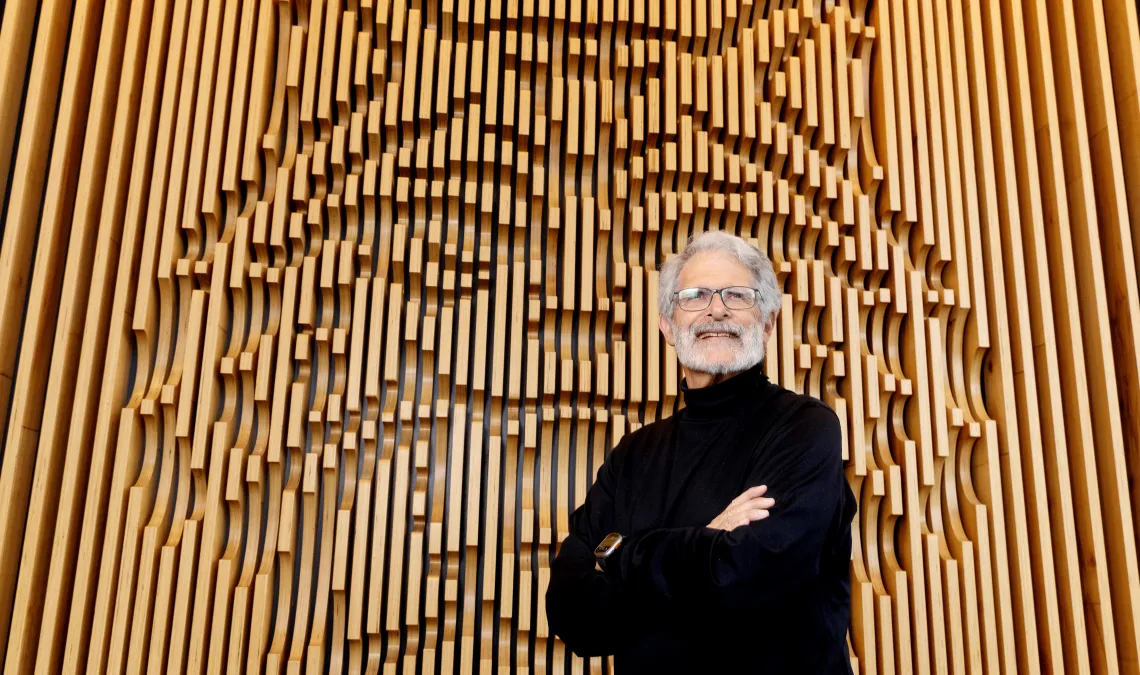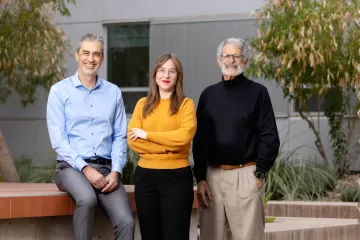Something Different, Something New
John Lee Compton makes a two-part gift encouraging honors students to explore.

John Lee Compton at the W.A. Franke Honors College.
Photo: Chris Richards
John Lee Compton is an avid photographer captivated by the desert and its creatures. Called to live among nature, he also is motivated to mentor students, urging them to explore possibilities.
“We’re constantly forced into boxes of various kinds,” says Compton, a retired biotech entrepreneur and business owner. He encourages students at the University of Arizona to get out of that box and realize, “Ooh, there’s a world out there I didn’t know existed.”
In his view, trying new things offers profound insights into one’s work and life. “It can make the difference between a humdrum life and an exciting one,” he says.
Ideation and exploration, in part, are the impetus for his $3.2 million gift to the W.A. Franke Honors College establishing the Compton Lab for Discovery and Innovation. This gift supports the college in two parts: the Compton Chair for Creative Intelligence and Innovation, a faculty position held by Caitlyn Hall that will oversee the college’s newest degree program, the Bachelor of Creative Intelligence and Innovation (BCII), as well as the Compton Fund for Exploration. The fund supports Exploratory Mini-Grants, up to $5,000 for an individual and $10,000 for a team, that encourage students to explore beyond their primary major and discipline.
“Maybe a student has a crazy idea,” he says, “something new or something they’ve been thinking about forever, but it’s not related to their studies.” Stipends from the Compton Lab provide funding for students to try something different, something new.

John Pollard, Caitlyn Hall and John Lee Compton at the W.A. Franke Honors College.
Photo: Chris Richards
“For some people, the funding isn’t going to change their academic career, but it can enrich their lives,” Compton says. Drawing from his own experience, he highlights how his study of photography sparked a lifelong interest. For others, he says the support might be transformative, helping them uncover a career path they hadn’t previously considered.
Compton’s passion for mentoring at the W.A. Franke Honors College was sparked by an early visit to student presentations with his wife, Lynn Toby Fisher. For him, the joy in mentoring lies in witnessing the moment a student grasps a new idea. “When you suddenly see something open up in them — a new way of looking at the world — it is absolutely magical,” he says.
His work with students inspired his first gift to the W.A. Franke Honors College, a student enrichment fund established with Lynn. The fund offered $500 to $1,000 grants for students to participate in class trips, visit museums and engage in activities that broadened their perspectives.
One example is Emily Allerton, who used the funding to study the native language of her grandfather’s family. She has since graduated and started a career in ethnobotany with a focus on familial Indigenous communities in the Pacific Northwest.
During the first year of the COVID-19 pandemic, Compton switched to assisting students remotely in crafting “elevator speeches,” persuasive presentations for simulated meetings with CEOs and investors.
During my interview with Compton, his insightful perspective and engaging storytelling made it easy to understand why he’s a valued mentor. From his bright and airy home office, he revealed the challenges of navigating the early part of the pandemic, compounded by the grieving process for Lynn, who passed away in early March 2020.
The couple hailed from New York City, where Lynn practiced as a corporate attorney and Lee was a leader in the biotech industry and the state biodiversity institute. He led a Maryland-based biotech company based on patented technology originally developed to safely use scorpion and spider venom as agricultural pesticides but repurposed to produce difficult-to-make proteins for the CDC and the U.S. Army. He also served as a land-use leader for their local community board.
During that time, Lynn and Lee visited Tucson regularly. They developed a deep affection for the community and made plans to retire in the Old Pueblo. They purchased and renovated a 1920s ranch house and then designed and built a new home nestled into a corner of the property. “To the extent we could, we made it part of the desert,” Compton says, making sure to preserve the desert ecosystem.
‘When you suddenly see something open up in them — a new way of looking at the world — it is absolutely magical.'
They moved in on Christmas Day 2019. Soon after, they returned east for Lynn’s mother’s memorial service. Unexpectedly, Lynn became ill and passed away. “She spent only 18 days in the new house,” he says.
Adapting to life without Lynn took time, but Lee sought refuge in the desert. He describes his kitchen window being at ground level, allowing him to see deer or javelina passing by. He communes with lots of critters, as he describes it, and has catalogued nearly 400 saguaro cacti on his 40-acre property.
“I’m part of the community. It’s not a human community; it’s a community of plants and animals, and it’s an incredibly strong connection,” he says. His rattlesnakes go by the name Ralph, his foxes are known as Rupert and the vultures are affectionately called Virgil. His favorite saguaro, Snaggletooth, stands wild-armed along his driveway.
Compton’s sense of curiosity and exploration is reflected in his history of giving to the W.A. Franke Honors College, both through mentorship and financial support. He says he enjoys visiting campus, with students and the college’s dean John Pollard, and will often visit a memorial dedicated to Lynn in the college’s village.

